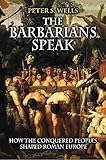The Barbarians Speak : How the Conquered Peoples Shaped Roman Europe / Peter S. Wells.
Material type: TextPublisher: Princeton, NJ : Princeton University Press, [2021]Copyright date: ©1999Description: 1 online resource (352 p.) : 9 halftones, 20 line illus., 2 tables, 16 mapsContent type:
TextPublisher: Princeton, NJ : Princeton University Press, [2021]Copyright date: ©1999Description: 1 online resource (352 p.) : 9 halftones, 20 line illus., 2 tables, 16 mapsContent type: - 9781400843466
- Germanic peoples -- Europe -- Influence
- Roman provinces
- Romans -- Europe
- HISTORY / Ancient / Rome
- Alamanni
- Anreppen
- Auerberg
- Augustus (Octavian)
- Bad Cannstatt
- Batavians
- Berching-Pollanten
- Brandopferplätze
- Burgundians
- Carnuntum
- Cherusci
- Clemency
- Dangstetten
- Drusus
- Epona
- Eschweiler-Laurenzberg
- Friedman, Jonathan
- Gallic War
- Goeblingen-Nospelt
- Gournay-sur-Aronde
- Gundestrup
- Haarhausen
- Hallstatt
- Harsefeld
- Hercules Magusenus
- Herodotus
- Heuneburg
- Hörgertshausen
- Jakuszowice
- Jastorf style
- Kelheim
- Kronwinkl
- Langobards
- Marcomannic Wars
- Nehalennia
- Norican Ware
- Oberaden
- Oberammergau (Döttenbichl)
- analogy in interpretation
- architecture, domestic
- auxiliary troops
- columns, of Trajan
- deities
- demography
- empires
- fibulae
- ideology, Roman
- inscriptions
- legionary troops
- postcolonial studies
- 936 21
- DG59.E8
- online - DeGruyter
| Item type | Current library | Call number | URL | Status | Notes | Barcode | |
|---|---|---|---|---|---|---|---|
 eBook
eBook
|
Biblioteca "Angelicum" Pont. Univ. S.Tommaso d'Aquino Nuvola online | online - DeGruyter (Browse shelf(Opens below)) | Online access | Not for loan (Accesso limitato) | Accesso per gli utenti autorizzati / Access for authorized users | (dgr)9781400843466 |
Browsing Biblioteca "Angelicum" Pont. Univ. S.Tommaso d'Aquino shelves, Shelving location: Nuvola online Close shelf browser (Hides shelf browser)

|

|

|

|

|

|

|
||
| online - DeGruyter Molding Japanese Minds : The State in Everyday Life / | online - DeGruyter Yoga in Modern India : The Body between Science and Philosophy / | online - DeGruyter A Constructed Peace : The Making of the European Settlement, 1945-1963 / | online - DeGruyter The Barbarians Speak : How the Conquered Peoples Shaped Roman Europe / | online - DeGruyter In the Realm of the Diamond Queen : Marginality in an Out-of-the-Way Place / | online - DeGruyter Outside the Fold : Conversion, Modernity, and Belief / | online - DeGruyter Shattered Hope : The Guatemalan Revolution and the United States, 1944-1954 / |
Frontmatter -- Contents -- List of Figures and Tables -- Preface -- Acknowledgments -- CHAPTER 1 Natives and Romans -- CHAPTER 2 Europe before the Roman Conquests -- CHAPTER 3 Iron Age Urbanization -- CHAPTER 4 The Roman Conquests -- CHAPTER 5 Identities and Perceptions -- CHAPTER 6 Development of the Frontier Zone -- CHAPTER 7 Persistence of Tradition -- CHAPTER 8 Town, Country, and Change -- CHAPTER 9 Transformation into New Societies -- CHAPTER 10 Impact across the Frontier -- CHAPTER 11 Conclusion -- Glossary -- Greek and Roman Authors -- Bibliographic Essay -- Bibliography of Works Cited -- Index
restricted access online access with authorization star
http://purl.org/coar/access_right/c_16ec
The Barbarians Speak re-creates the story of Europe's indigenous people who were nearly stricken from historical memory even as they adopted and transformed aspects of Roman culture. The Celts and Germans inhabiting temperate Europe before the arrival of the Romans left no written record of their lives and were often dismissed as "barbarians" by the Romans who conquered them. Accounts by Julius Caesar and a handful of other Roman and Greek writers would lead us to think that prior to contact with the Romans, European natives had much simpler political systems, smaller settlements, no evolving social identities, and that they practiced human sacrifice. A more accurate, sophisticated picture of the indigenous people emerges, however, from the archaeological remains of the Iron Age. Here Peter Wells brings together information that has belonged to the realm of specialists and enables the general reader to share in the excitement of rediscovering a "lost people." In so doing, he is the first to marshal material evidence in a broad-scale examination of the response by the Celts and Germans to the Roman presence in their lands.The recent discovery of large pre-Roman settlements throughout central and western Europe has only begun to show just how complex native European societies were before the conquest. Remnants of walls, bone fragments, pottery, jewelry, and coins tell much about such activities as farming, trade, and religious ritual in their communities; objects found at gravesites shed light on the richly varied lives of individuals. Wells explains that the presence--or absence--of Roman influence among these artifacts reveals a range of attitudes toward Rome at particular times, from enthusiastic acceptance among urban elites to creative resistance among rural inhabitants. In fascinating detail, Wells shows that these societies did grow more cosmopolitan under Roman occupation, but that the people were much more than passive beneficiaries; in many cases they helped determine the outcomes of Roman military and political initiatives. This book is at once a provocative, alternative reading of Roman history and a catalyst for overturning long-standing assumptions about nonliterate and indigenous societies.
Mode of access: Internet via World Wide Web.
In English.
Description based on online resource; title from PDF title page (publisher's Web site, viewed 30. Aug 2021)


